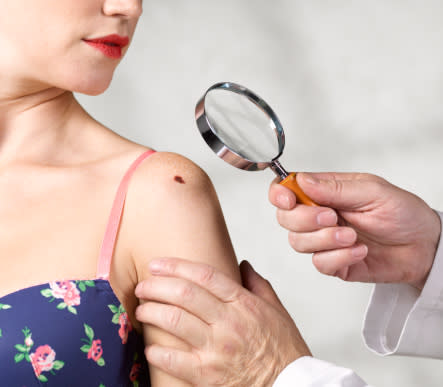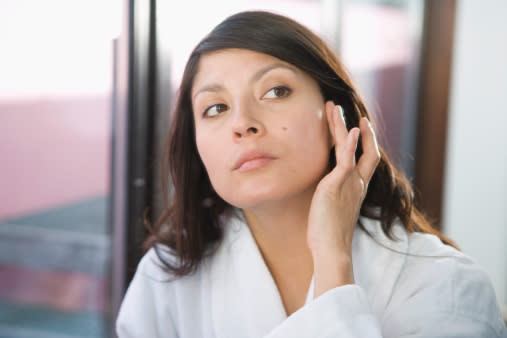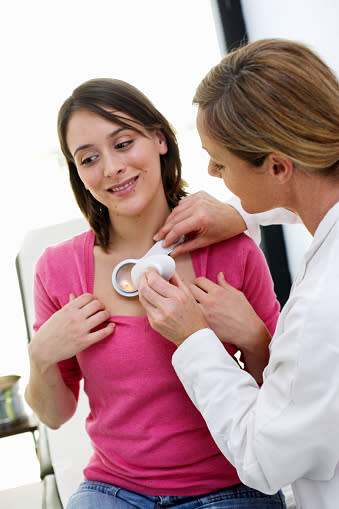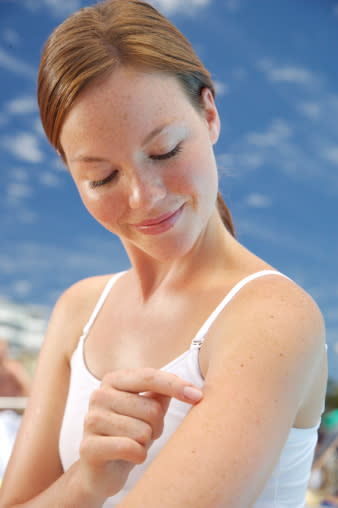Moles: How Do We Know When There's Something Wrong?

Why aren’t more health experts raising awareness of getting moles checked? [Photo: Rex Features]
Clear, healthy skin is a common goal for many of us. But although we get our teeth and eyes checked, many of us don’t consider getting our skin checked regularly too. Now that summer is in full swing, we tend to think more about skin health, but it’s not just about tanning safely. Moles and skin tags can become problematic and with 86 per cent of malignant melanoma cases actually being preventable, knowing what to look out for is important.
Skin cancer is the most common form of cancer in the UK and the rates continue to rise. Some 100,000 new cases now diagnosed each year and the disease kills over 2,500 people annually - that’s seven people every day.

Just as we all book dentist appointments, we should get our skin checked regularly too [Photo: Getty]
We spoke to Dr Stefanie Williams from European Dermatology London (Eudelo) to talk about the importance of checking your skin - and knowing what to look out for.
“I think one of the most common mistakes people make about their skin is that they don’t take their mole health very seriously,” says Stefanie. “People hardly ever have their moles checked out. You could argue it’s probably much more important than seeing a dentist because it can have very serious consequences if you miss something.”
Although some of us burn and tan quicker than others, it’s important to note that checks are for everybody, since any skin type can develop skin problems. But who’s most at risk?
“If you have a fairer skin type or red hair and you burn very easily in the sun, then you are at a higher risk of a skin cancer,” says Stefanie.
“Also if you have a family history of skin cancer, or if somebody in your blood family has suffered with a skin cancer in the past, you have a higher risk of skin cancer.”

All skin types need to be checked [Photo: Getty]
So, what happens when you get your moles checked?
“The good news is that a mole check is completely painless,” says Stefanie. “Your dermatologist will likely ask you to undress to your underwear before they have a look at all of your moles. They will examine the entire skin surface since you can get moles in unlikely places like between your toes, on your scalp, between the hair.”
If the dermatologist notices something that needs a closer look, he or she will use a dermatoscope - which makes the invisible pigment under the skin more visible - to take a closer look.
In most cases, after using the dermatoscope, the dermatologist will be able to tell you if that mole is healthy, not healthy or suspicious. “This whole process takes about half an hour. So it’s a really quick and easy thing. There’s really no excuse not to get a mole check done once per year.“

A routine check can help give you peave of mind [Getty]
But not all of us have private healthcare plans, and seeing a dermatologist is an expensive business. Fortunately, checking your moles at home can be almost as beneficial - providing you know what you’re looking for.
Carry out monthly checks on your moles and you’ll start to recognise what’s normal for you and what’s different. Keep an eye out for colour changes, changes in height and shape. Symptoms like itchiness, oozing and bleeding should not be ignored.
“If you notice something odd, it’s a sign that you should go and make an appointment with a dermatologist to have that mole examined,” says Stefanie. “I recommend this, in addition to doing a routine annual checkup for peace of mind.”

Get clued up on what to look out for at home [Photo: Getty]
If you think something has changed, then see your GP as quickly as possible. Like with any illness, early diagnosis is always best.
“Sometimes I hear patients who come quite late to the clinic for a mole check and they might tell me that they actually have noticed changes in those moles for maybe two or three years but were just really scared to go and see a dermatologist because they didn’t want to hear negative news,” says Stefanie.
The earlier you book a doctor’s appointment, the greater the chance of complete recovery. “If you leave it too long and if skin cancer is caught in advanced stages, there are potentially quite serious consequences. That makes all the difference - catch it early, we take it out, all done. Catch it too late, it might potentially be deadly. A really easy decision there, I think.“
Do your moles concern you? Tweet us at @YahooStyleUK.
How Often Do We Actually Need To Wash?
Gemma Arterton Talks Lazy Skincare, Inner Confidence And How She’s Bouncing Back


